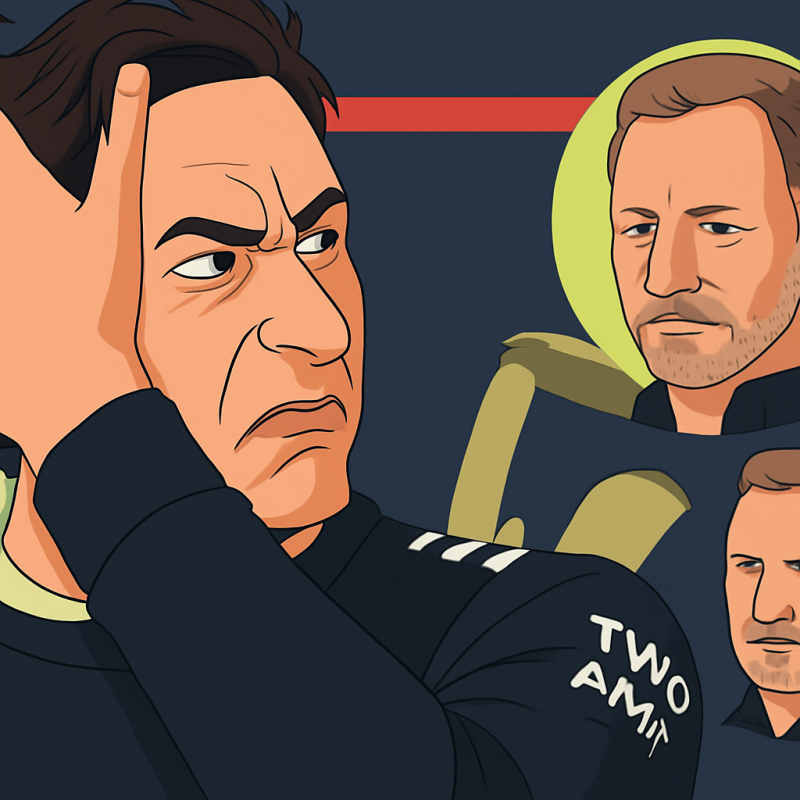Toto Wolff on life without Horner: “It’s weird… but F1 needs its villains”
Toto Wolff says the paddock feels “quite strange” without Christian Horner, revealing the former Red Bull boss texted him after his dismissal to joke that Wolff would be “lost” without his favorite adversary.
Horner was removed from his role after the British Grand Prix, ending a two-decade run that yielded six Constructors’ titles and eight Drivers’ crowns at Red Bull, split between Sebastian Vettel and Max Verstappen. In his place, Racing Bulls chief Laurent Mekies has stepped up to run the energy drink giant’s works outfit as chief executive and team principal.
Wolff and Horner shaped the last decade’s political theater as much as the on-track battles did. Their 2021 title war pitted Verstappen against Lewis Hamilton and lit the fuse on one of the sport’s spiciest rivalries. Verstappen went on to reel off four consecutive titles from 2021, and Red Bull’s dominance only sharpened the edges between the team bosses.
Wolff admits he’s conflicted about the new landscape. He respects Horner’s record, he said, and within Red Bull’s walls the 51-year-old commanded plenty of clout. But they rarely saw the world the same way. “A wonderful, great enemy,” is how Wolff described him. Then the quieter admission: it’s odd arriving at a grand prix and not seeing Horner there.
In Zandvoort, Wolff couldn’t resist a grin as he relayed Horner’s message — a cheeky line about Wolff’s love of hating him — before turning serious about what the sport loses when a character exits stage left. He’s since rowed back from a barbed summer-break swipe, clarifying that Formula 1 needs “massive characters,” the kind who stir the pot and give the blockbuster its cast list. In his words, every good film needs its good, its bad and its ugly. With Horner gone, he quipped, it’s down to him and Ferrari’s Fred Vasseur to carry the franchise.
The mood music at Red Bull has changed with Mekies, Wolff added, praising the Frenchman’s pragmatism and hinting conversations suddenly have a longer-term feel. Translation: fewer theatrics, more spreadsheets. Whether that lasts when the pressure ramps up is anyone’s guess.
As for Horner, few in the paddock expect him to sit on the sofa for long. The smart money says he’ll reappear in a role with ownership heft — not unlike Wolff’s hybrid of team boss, CEO and shareholder at Mercedes — if the right project lands. Alpine has been the obvious rumor mill fodder given persistent questions over Renault’s commitment, but the old guard around the sport have poured cold water on that pairing for now.
Wolff, never one to waste a punchline, joked last weekend that a Horner reunion with Bernie Ecclestone and Flavio Briatore would look like “the mafia” getting back together. You sense he’d buy a ticket to watch it, too.
Strip away the jabs and there’s a grudging appreciation here. Wolff knows that villains — or the people painted as such, depending on your colors — give F1 its narrative spine. Protagonists need antagonists. Horner played the role with relish: outspoken, confrontational, often infuriating to rivals and irresistible to cameras. He made enemies and headlines in equal measure, and the sport rarely looked away.
Whether Red Bull 2.0 under Mekies keeps winning as relentlessly is the sporting question. Whether the show feels the same without Horner prowling pit wall to pit wall is the other one. Wolff’s answer, half-smile intact, tells you he already knows. It’s quieter. It’s calmer. It’s a bit weird. And, in a championship that thrives on friction, maybe a little too tidy.




